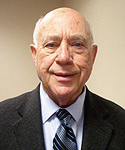老老年高血压患者的血压目标管理

Wilbert S Aronow 美国韦斯切斯特医学中心/纽约医学院
ACCF/AHA于2011 年与其他多个学会基于前瞻性临床试验数据,联合发表的高血压共识指出,年龄<80岁的高血压患者应将血压降至140/90 mm Hg以下以减少心血管事件发生。根据老老年患者高血压试验(HYVET)研究结果,ACCF/AHA 2011指南推荐,≥80岁患者如能耐受应尽可能将收缩压降至140~145 mm Hg。
HYVET研究是目前在年龄≥80岁人群中开展的唯一一项前瞻性、长期、随机、双盲和安慰剂对照降压研究,入选3845例年龄≥80岁、收缩压≥160 mm Hg的患者(平均年龄为83.6岁,女性占61%,合并心血管疾病者占12%),将其随机分为吲达帕胺加培哚普利组与双盲安慰剂组,平均随访1.8年。目标血压为150/80 mm Hg,治疗后达到的最低收缩压为143 mm Hg。随访第2年时,与基线相比,安慰剂组与治疗组的坐位血压分别降低14.5/6.8 mm Hg和29.5/12.9 mm Hg,立位血压分别降低13.6/7.0 mm Hg和28.3/12.4 mm Hg。
随机分配至降压药物治疗组的患者致死性/非致死性卒中、致死性卒中、全因死亡、心血管死亡及心力衰竭的发生风险分别降低30%(P=0.06)、30%(P=0.05)、21%(P=0.02)、23%(P=0.06)和64%(P<0.001)。因全因死亡率显著降低21%,故数据与安全监测委员会停止了该研究。
HYVET研究的结果支持将接受降压药物治疗的≥80岁老人的目标血压设为150/80 mm Hg。研究中,48%的患者能达该目标血压。高血压患者的心血管疾病患病率较高,因此,药物治疗有望能显著降低其心血管事件。
HYVET 研究并未提供≥80岁体弱患者降压药物应用的相关数据。观察性研究及流行病学数据无法替代随机临床试验,不能用于推荐血压目标值的设定。HYVET研究并未阐明≥80岁老年患者的收缩压是否应降至140 mm Hg以下,也未解答降压治疗最佳目标舒张压。亟需进一步临床试验确定生活方式干预、各种降压药物及其他介入治疗措施对≥80岁老年患者的血压控制疗效及最佳血压控制目标值。
The ACCF/AHA 2011 expert consensus document on hypertension in elderly, developed in collaboration with several key American and/or European groups* recommended on the basis of prospective clinical trial data that the blood pressure should be lowered to less than 140/90 mm Hg in adults younger than 80 years of age to reduce the incidence of cardiovascular events. On the basis of data from the Hypertension in the Very Elderly Trial (HYVET), the only prospective, long-term, randomized, double-blind, placebo-controlled antihypertensive study in adults aged 80 years and older, the ACCF/AHA 2011 guidelines recommended lowering the systolic blood pressure to 140~145 mm Hg if tolerated in adults aged 80 years and older.
HYVET included 3,845 patients (61% women) aged 80 years and older, with a mean age of 83.6 years, systolic pressure of 160 mm Hg or higher who were randomized to indapamide plus perindopril, if needed, versus double-blind placebo. Only 12% of the patients had cardiovascular disease. The target blood pressure was 150/80 mm Hg, and the lowest systolic blood pressure reached was 143 mm Hg. Median follow-up was 1.8 years. At 2 years, compared with baseline, the blood pressure while the patient was seated was 14.5/6.8 mm Hg lower on placebo and 29.5/12.9 mm Hg on drug therapy, and standing blood pressure was 13.6/7.0 mm Hg lower on placebo and 28.3/12.4 mm Hg on drug therapy.
Those randomized to anti-hypertensive drug therapy showed a 30% reduction in fatal or nonfatal stroke (P=0.06), 30% reduction in fatal stroke (P=0.05), 21% reduction in all-cause mortality (P=0.02), 23% reduction in cardiovascular death (P=0.06), and 64% reduction in heart failure (P<0.001). The 21% significant reduction in all-cause mortality was the reason the Data and Safety Monitoring Board stopped the study.
The results from HYVET support a target blood pressure of 150/80 mm Hg in octogenarians receiving antihypertensive drug therapy. Target blood pressure was reached in 48% of those patients. Hypertensive patients with a higher prevalence of cardiovascular disease would be expected to have a greater absolute reduction in cardiovascular events from drug therapy.
HYVET did not give us data on the use of antihypertensive drugs in frail octogenarians. Observational and epidemiological data are no substitute for randomized clinical trials and cannot be used to recommend blood pressure goals. HYVET did not answer the question whether the systolic blood pressure should be lowered below 140 mm Hg nor did it identify optimal diastolic blood pressure targets for octogenarians should be. Clinical trial data are needed to determine the efficacy of lifestyle measures, different types of antihypertensive drugs, and other interventional approaches to control hypertension in patients aged 80 years and older as well as the optimal blood pressure goal.
* the American Academy of Neurology, the American Geriatrics Society, the American Society for Preventive Cardiology, the American Society of Hypertension, the American Society of Nephrology, the Association of Black Cardiologists, and the European Society of Hypertension.
上一页 [1] [2] [3] [4] [5]